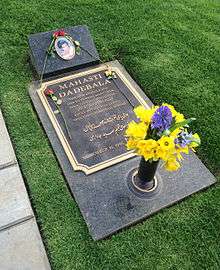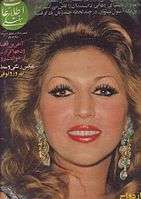Mahasti
| Mahasti | |
|---|---|
|
Mahasti 1970's | |
| Background information | |
| Birth name | Eftekhar Dadehbala |
| Born |
16 November 1946 Tehran, Iran |
| Origin | Tehran |
| Died |
25 June 2007 (aged 60) Santa Rosa, California, U.S. |
| Genres |
Classical Pop Folk Traditional |
| Occupation(s) | Singer |
| Years active | 1963–2007 |
| Associated acts | Hayedeh |
Eftekhar Dadehbala (Persian: افتخار ددهبالا), better known as Mahasti (Persian: مهستی, 16 November 1946 – 25 June 2007), was an Iranian singer. She was the younger sister of singer Hayedeh.
Background
Mahasti was an Iranian singer who was recognized as the "Banooye Golhaa va Delha" (Lady of hearts & flowers). She was the younger sister of another popular Iranian female singer, Hayedeh. Mahasti's voice was discovered by maestro Parviz Yahaghi, a distinguished Iranian composer and violinist. She started her career on the Persian traditional music radio program Gol hâ ye Rangârang ( گلهای رنگارنگ), in 1963, with the song "Ân ke Delam Râ Borde Xodâyâ" (Persian -آنكه دلم را برده خدایا) composed and arranged by maestro Parviz Yahaghi with lyrics by Bijan Taraghi.
Career
In the beginning, Mahasti's family was reluctant to allow her to pursue a career in entertainment because it was not an appreciated career for women in Iran at that time. However, Mahasti overcame this stigma providing Iran with a new image for women within the entertainment industry. Mahasti created an image of a "gentle-woman" singer, a lady with great manners. Her enormous success in music opened the pathway for many other women, including her elder sister, Hayedeh, who started her work 5 years after Mahasti. The two sisters had tremendous contributions to improving the image of female singers in Iran and in transitioning the Iranian music from where it was to where it is now.[1]
Personal life
Mahasti's parents got divorced and got married to other people. When she wanted to pursue a career of singing her parents weren't happy because of society's look upon female singers at the time. Mahasti married Kouros Nazemiyan and gave birth to her only child, Sahar. Mahasti and her family lived in Abadan for several years, finally moving back to Tehran. Her marriage with Nazemiyan ultimately ended in divorce. Nazemiyan was executed by the Revolutionary Court of the new Islamic Republic shortly after revolution. Several years later she remarried, to Bahram Sanandaji, owner of a shoe factory, however their marriage was also dissolved.
In 1978, before the Iranian Revolution she emigrated to the UK and then to the United States in 1981 where she lived thereafter.
Death

In March 2007, Mahasti publicly announced that she had been battling colon cancer for four years. She hoped that her experience would raise awareness within the Iranian community regarding cancer and the significance of constant physical examinations. She was then living in Santa Rosa, California with her daughter, Sahar, her husband, Naser, and their two children, Natasha and Natalie, her only grandchildren. She died on June 25, 2007 in Santa Rosa.
Mahasti was interred at the Westwood Village Memorial Park Cemetery in Westwood, California on June 29, 2007 the same cemetery where her sister Hayedeh was also buried. Her funeral was broadcast live on Persian Broadcasting Company Tapesh and was attended by many Persian celebrities and stars and other artists including the mayor of Beverly Hills Jimmy Delshad and designer Bijan Pakzad.[2][3][4]
Discography
Albums
- 1991: Bi Nava Del
- 1991: Gol-haye Ranga-Rang
- 1981: Sepedeh Dam
- 1991: Ziafat
- 1992: Album 2
- 1992: Asir
- 1992: Mosafer
- 1993: Ghasam
- 1993: Moj
- 1994: Nameh
- 1994: Ashofteh
- 1994: Beganneh
- 1994: Havay Yaar
- 1995: Parandeha (with Leila Forouhar, 'Shahram Solati')
- 1995: Hagheghat
- 1996: Bazm Mahasty & Sattar
- 1996: Labkhand
- 1998: Havay Asheghi
- 1999: Avazak
- 1999: Hamishe Ashegh
- 1999: Tou Bezan ta Man Beraghsam
- 2000: Deldadeh
- 2001: Gole Gandom (with Sattar)
- 2003: Hamisheh Sabz
- 2005: Az Khoda Khasteh
